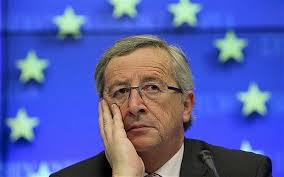In a bid to manage migrant flows, the European Union and Balkan leaders have agreed to a plan that foresees large reception centers. The centers would be established along the route from Greece to Germany.
Speaking at a joint news conference, European Commission President Jean-Claude Juncker said the eight EU countries on the migrants’ route into Europe, together with Serbia, Macedonia and Albania, have agreed to “increase capacity to take in migrants to 100,000 places in Greece and the Balkans.
“The only way to restore order to this situation is to slow down the uncontrolled flow of these people,” Juncker said.

Half of the places in reception centers will be in Greece, with the other 50,000 on the route through the Balkans – in countries such as Macedonia and Serbia.
The plan also aims to put a stop to countries facilitating the movement of migrants to other countries’ borders. “We have made it very clear that the policy of simply waving people through must be stopped,” Juncker said.
Other key points of the agreement include stepping up the activities of the EU’s border agency Frontex, and expanded information gathering and sharing on migrants entering the EU, as well as on their movement once in the bloc.
Juncker, speaking after the Brussels meeting early on Monday, further noted that 400 police officers would be deployed to Slovenia within a week. They are to help the Alpine country cope with the overwhelming number of people arriving at its border.
Slovenia counts record migrant entries
Slovenia meanwhile reported a record 15,000 migrants entering the country on Sunday. Slovenia’s Interior Ministry spokeswoman Vesna Mitric said that five trains packed with asylum-seekers had already arrived from Croatia with more expected overnight.
Interior Ministry spokesman Mitric said, “No country could deal normally with such a large wave that Slovenia has faced today.”
She added, “We are doing the best we can, but Slovenia does not have unlimited capacity of space, human resources, equipment or logistics.”
Migrant arrivals to Slovenia escalated 10 days ago, after Hungary closed its border to Croatia.
At the meeting of EU and Balkan leaders in Brussels on Sunday, Slovenia’s Prime Minister Miro Cerar warned that EU would “start falling apart” without concrete action on dealing with the migrant situation.
In the week to Saturday, there were 58,000 arrivals in Slovenia, with many people waiting in wet and cold conditions. “We will not be able to endure this for weeks if we do not get help,” Cerar said.
Merkel calls for burden sharing
On Sunday, attending the Brussels meeting, Merkel said refugees needed “relief, sensible shelter and facilities to wait and rest.”
All of the countries bordering the refugee route through the Balkans were signatories to the Geneva Convention on refugees, she noted.
Merkel, who had pushed for the Brussels meeting to be called, said: “Europe must show it is a continent of values, a continent of solidarity … This is a building block, but we need to take many further steps.”
The German leader said that further discussions with Turkey were of paramount importance.
“Cooperation with Turkey is the only way to succeed in making illegality legal and to share the burden better between Turkey and Europe,” Merkel added.
Turkey was not present at the Brussels meeting on Sunday.
OPINION: EU refugee summit over Balkan route has saved Europe for now
Facing the complete failure of the handling of the refugee crisis, key European Union (EU) states have agreed upon emergency measures. These need to work now, otherwise the EU is in danger, says DW’s Bernd Riegert.
It was only under great pressure, following threats and mutual abuses, that the heads of government of European countries through which the refugees are traveling managed to agree on a list of short-term measures. But at least they managed to agree in the end.
It was European Commission President Jean-Claude Juncker who proposed the plan to bring order to the shameful chaos seen across the Balkans. So he is the hero of the hour.
Hours of debates
Initially the representatives of the Balkan countries spent hours throwing blame at each other, until the seriousness of the situation forced them to grudging concessions. It was not only the catastrophic situation of tens of thousands of refugees who are lacking the most basic support, like food and shelter, that needed to be addressed swiftly. It was also that the concept of European unity as such was on the line.
And should the governments now fail to swiftly implement the agreed measures, then they and the European Commission would risk losing all credibility.
On several occasions over the past few weeks, special European summits have ended in agreements that weren’t followed through. The latest emergency plan is the last chance to get a grip on the outrageous situation along the route through the Balkans.
If authorities really manage to quickly set up accommodation and registration facilities for 100,000 refugees, that would indeed be a breakthrough. Then it would no longer be possible to just pass the refugees on for the next country to deal with.
Greece plays a key role
Greece is in a pivotal position. It is the point of entry for thousands of refugees, but has so far done little to comply with its commitments. Now the maudlin excuse – saying we have an economic crisis and Turkey is to blame – is no longer valid. Prime Minister Alexis Tsipras has to deliver. As a precaution, the EU has made it clear to Tsipras that, ultimately, he is completely dependent on the financial commitments of the Europeans.
Hungary is not playing along whatsoever. Prime Minister Victor Orban has, however, taken a beating for his cynical position. The Hungarian leader said he is now only an observer of this disagreeable situation, as his country no longer lies on the migrants’ route to Europe. The EU made it clear to him, however, that his country was one of the main recipients of EU money.
Somewhere there is a moral limit. Partitioning off, hiding away, walling in – those are not European remedies. The special meeting in Brussels reiterated this once again. But how long will this solidarity, revived out of necessity, hold?
Problem of external borders
The refugee crisis is not resolved thanks to the Balkan route summit, nor will it stem the tide, but the crisis will hopefully be managed more humanely. The transit of refugees from Greece to Germany will also hopefully become more orderly. And there lies the biggest problem for Chancellor Angela Merkel. Thousands of people will continue to arrive in Germany everyday.
Until the EU’s external borders are protected again, until refugees and asylum seekers can be registered and cared for in Greece or Italy, or even sent back, then weeks, if not months of the same situation lie ahead. It could also take months until Turkey begins to pull its weight too. Can Germany, can Merkel hold on so long?
The whole Balkan refugee chain will only continue to work as long as Germany and some other countries take in refugees at the end. If Germany or Austria close off their borders, there would be utter chaos in the Balkans. Some countries have therefore openly threatened the chancellor, saying they too would seal off their borders – making Merkel personally responsible for the swelling influx of refugees. The end of the EU as we know it would then be inevitable.
If all goes well, last night’s decisions will provide some short-term relief. But further hard work is necessary to find a long-term solution – not only for the refugees’ sake, but also for the sake of Europe.
-DW.COM














